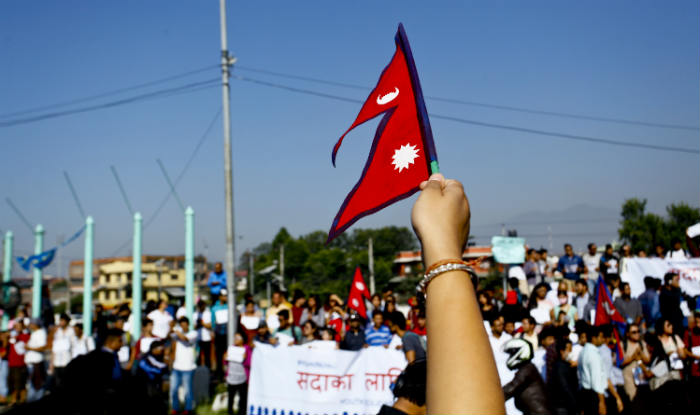Nepal On The Edge

The constitution amendment proposal tabled by the incumbent government on November 29 somehow reflects the seven-point amendment proposed by India last year. This time though PM Pushpa Kamal Dahal aka Prachanda has failed to gather solid support neither from the opposition party UML nor from the Madhesi parties. It appears to be an uphill task for the current prime minister who appears to be in the mood of leaving the honorable seat after passing the amendment to the constitution. His desire, however, is subject to the flexibility of other parties.
Madhesi leaders and the Communist Party of Nepal (United Marxist-Leninist) (CPN-UML) party have rejected the bill and the parliament has been obstructed by the opposition party. However, the parliament needs 2/3 votes to pass the constitution amendment – which means UCPN (M) needs the support of Nepali Congress (NC), United Democratic Madhesi Front (UDMF), Federal Alliance (FA) and Rastriya Prajatantra Party (RPP). After the announcement of the amendment proposal, public vented their anger on social media, and the following days Birgunj and other districts in Province 5 and western Nepal witnessed protests.
Federalism hasn’t done well for India too. The bitter infighting between states like Karnataka and Tamil Nadu is a prime example. The same question arises in Nepal, and with a smaller population and geography, what would seven provinces do for the nation?
The CPN (UML) party believes that India wants two provinces in Terai region so that they can cede later. This conspiracy theory might be true or false but that’s the only reason why the amendment has divided people and parties in Nepal right now. In International Relations, it is difficult to predict a nation’s intention, so it is too premature to say if it’s true. However, India under Modi has erred gravely in the past – including the 2015 economic embargo, indifference to the constitution, and speaking ill of Nepal and its human rights at the international level. These three particular events have instilled a demagogue fear in Nepalis that Modi under India is out to engulf Nepal by hook or crook. The visit by the Indian President Pranab Mukherjee also didn’t douse the fire as the three-day event turned out to be a hassle for the public in Kathmandu as the roads were emptied out for his day-to-day travels. Next was Ramdev guru – his land allocation controversy faced similar opposition. It is encouraging that India is doing its best to mend the bridge but maybe it’s not doing the right way and Nepali leaders are the same. There’s also a growing sense among opposing parties and the public that India is seeking to control its water resources and border points as they would fall under Province 5 and 2.
Indian ambassador to Nepal, Ranjit Rae, met with the Madhesi leaders and had a conversation with them at the embassy’s location in Lainchaur. He later assured Prachanda that they would be supporting the bill. While Madhesi parties and UML are not optimistic about the bill, India although appears well assured that it would finally fulfill their demands. This clearly suggests that India’s security, wants and fears are incorporated in the bill. The official statement made by the Indian embassy though repels that argument as they state -- “Our consistent position has been that peace, stability, and progress of Nepal is in the interest of both India and Nepal. We have therefore been supportive of initiatives of the Government of Nepal to meet the aspirations of all sections of its society through dialogue and constitutional processes. As part of the ongoing efforts, the registering of a Constitution Amendment Bill in the Nepali Parliament on 29 November 2016 is an important step. We hope that all sides will remain closely engaged and the ongoing efforts would be concluded successfully. As a close and friendly neighbor of Nepal, India will continue to extend all support for Nepal’s peace, stability and accelerated economic development in accordance with the priorities of the people and government of Nepal.”
PM Dahal is now opting for another solution – hold elections. But yet again several parties do not believe that holding an election sans amendment is a sound move. The issue of amendment to the constitution has deeply divided the parties and public in Nepal.
It is clear that India is in no mood to change its stance as the Delhi government didn’t support Nepal’s constitution last year, but has openly vouched for the constitution amendment. India is right in its own place since it fears China’s encroachment and doesn’t wish Nepal to escape the pax-Himalaya ‘inner circle’. India’s eccentric move has irked the CPN-UML party as it believes that the ousting of former PM K.P. Oli was India’s hand. Also, it is not happy that India is now supporting the amendment and two-province Terai model as it had proposed a similar federal map in the Political Dialogue Committee of the Constituent Assembly (CA). On the other hand, Naya Shakti’s leader Baburam Bhattarai, who also was part of that CA committee, is criticizing UML for their double-standard attitude. Nepali leaders and parties need to sort out their differences to reach a settlement or else the nation will face unknown disaster if the constitution isn’t amended and implemented.
India has to understand the patriotic sentiments of people in the hills. It will be unfortunate for Nepal’s quasi-sovereignty and India’s stability if political instability continues unabated in the lynched Himalayan nation. Perhaps these two nations need to come to the term that federalism might not really work for Nepal. If it believes otherwise, India has to prove to Nepal that it is indeed a good neighbor and doesn’t have any trick cards under its sleeves. China, up in the north, is watching carefully – ready to play its game of thrones.
(Arun is the digital editor for Anna Note. He tweets at @arunbudhathoki)



